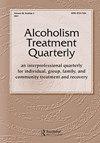接受酒精使用障碍治疗的社会稳定女性戒酒的预测因素
IF 0.9
Q4 SUBSTANCE ABUSE
引用次数: 0
摘要
社会稳定女性酒精使用障碍(AUD)治疗结果的预测因素存在知识缺口。本研究考察了社会稳定的女性在AUD治疗结束12个月后可能预测禁欲的因素。57名AUD患者参加了为期12个月的随访。通过结构化访谈和自我报告工具收集有关社会人口学、酒精相关、精神症状、心理功能以及参与者的治疗目标和改变饮酒习惯的能力的信息。通过单变量和多变量logistic回归模型计算12个月随访时戒断的预测因子。无儿童期虐待史(OR: 8.13;95%置信区间:2.22—-29.75;p < 0.01)和治疗结束时戒断的目标(OR: 15.17;95%置信区间:3.45—-66.69;P < 0.001)。大多数参与者(约60%)达到了戒酒或低风险饮酒的目标。研究结果强调了识别有童年虐待经历的患者的重要性,因为这种经历可能会对AUD治疗的结果产生不利影响。我们的研究结果还强调了患者自己的禁欲目标的重要性,因为它导致了最稳定的结果。因此,治疗也可以侧重于激励个人以禁欲为目标。本文章由计算机程序翻译,如有差异,请以英文原文为准。
Predictors for Abstinence in Socially Stable Women Receiving Treatment for Alcohol Use Disorder
ABSTRACT There is a knowledge gap about predictors of treatment outcomes in alcohol use disorder (AUD) in socially stable women. This study examined factors that may predict abstinence 12 months after the end of treatment for AUD in socially stable women. Fifty-seven women with AUD participated in 12-month follow-up. Information about sociodemographic, alcohol-related, psychiatric symptoms, psychological functioning, and participants’ treatment goals and ability to change alcohol habits were gathered from structured interviews and self-report instruments. Predictors for abstinence at the 12-month follow up were calculated by univariable and multivariable logistic regression models. Significant predictors for abstinence were having no history of childhood abuse (OR: 8.13; 95%CI: 2.22–29.75; p < .01) and a goal of abstinence at the end of treatment (OR: 15.17; 95%CI: 3.45–66.69; p < .001). Most participants (>60%) achieved their goals of abstinence or low-risk drinking. The results highlight the significance of identifying patients with experiences of childhood abuse, since such experiences may adversely affect the outcome of AUD treatment. Our findings also emphasize the importance of patients’ own goals of abstinence, since it resulted in the most stable outcome. Treatment could, therefore, also focus on motivating individuals to aim for abstinence.
求助全文
通过发布文献求助,成功后即可免费获取论文全文。
去求助
来源期刊

Alcoholism Treatment Quarterly
SUBSTANCE ABUSE-
CiteScore
1.60
自引率
11.10%
发文量
31
期刊介绍:
Alcoholism Treatment Quarterly is an exciting professional journal for clinicians working with persons who are alcoholic and their families. Designed to bridge the gap between research journals and information for the general public, it addresses the specific concerns of professional alcoholism counselors, social workers, psychologists, physicians, clergy, nurses, employee assistance professionals, and others who provide direct services to persons who are alcoholic. The journal features articles specifically related to the treatment of alcoholism, highlighting new and innovative approaches to care, describing clinical problems and solutions, and detailing practical, unique approaches to intervention and therapy.
 求助内容:
求助内容: 应助结果提醒方式:
应助结果提醒方式:


